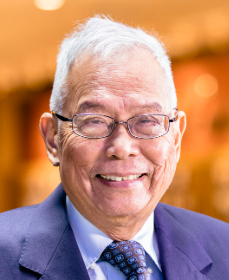It’s non-negotiable: “Money does matter, but God matters more”
Dr Lee Soo Ann // January 7, 2020, 10:46 pm

Dr Lee Soo Ann, a business and economics professor. discusses the role of money in the life of a Christian. Photo by Viacheslav Bublyk.
Money started out as the use of an object to provide convenience to people involved in exchange. Instead of barter-trade, we can exchange better through the use of money.
How then did it obtain a position of superiority over humankind who invented money and become a repository of trust?
Trust is there where God is recognised as our real Master.
Today, Christians need to acknowledge that money is merely an object in which trust needs to be conferred.
Money itself does not generate trust. Trust is between persons and when there is trust, there is the economic activity of buying and selling that arises from the use of money.
Christians need to point people to Who is outside money for such trust to exist.
In God we trust
God created persons. From knowing ourselves to be created by God, Christians can testify that only from God can there be trust – for God, as a Person, created us persons.
People need to acknowledge that it is God who created them as persons. Persons can therefore trust each other, despite the long supply chain in which there are many steps which deceptively seem trustworthy but are not so.
A corporation often treats us as non-persons. But Jesus cared for people as persons – not as cogs in a machine.
When God is seen to be in each of these many steps (the persons involved in economic activity in each step), we can trust.
God can be trusted to sustain us, having created us. We must trust God to sustain us, and help each other believe in such sustenance. Trust is there where God is recognised as our real Master.
Let us put God as Master in several aspects of economic life:
- God as Master in corporate life: God is a Person, and from God we learn what it means to be a full person. A corporation is not a person and often treats us as non-persons. Others in the corporation often become non-persons in their attitudes and behaviour. Opposition to Jesus came from persons who were legalistic, bureaucratic and opportunistic. Jesus forgave them and through His victory over death, Jesus gives us the freedom to live as persons though working in an impersonal context.
Jesus cared for people as persons – not as cogs in a machine. With God as Master, we can cry out to Him and live as persons, as Jesus did in His time. - God as Master in a technological society: Technology is like a physical prison which, although seemingly comfortable, yet is destructive of personhood. Everywhere, I see people tied to their devices although they are travelling or on vacation. How can God be our Master when technology binds us seven days a week, 24 hours a day?
We need to acknowledge God as the creator of scientific discoveries which led to the widespread use of technology. New technology can therefore be applied and we should be open to other technologies which are supportive of personhood. - God as Master in economic dividing and multiplying: Through the use of money, man is continually dividing revenue by cost and striving to remain competitive. We can rise above product differentiation and profit maximisation by following Jesus in the simplicity He enjoyed in His lifestyle. He satisfied only basic needs and, though He wined and dined with others, He never lost His identity as God’s Son. We too can, by putting God as our Real Father, live as God’s children despite having to live in a man-made world of changing fashions and competitive behaviour.
God is truly a generous God who gives more than we can imagine. Can we not trust Him to provide for what we need, and not what we want? Even through markets?
Money as servant
When God is truly Master, money becomes a mere servant. The power of a master is the power to dismiss a servant. Philip Yancey, the Christian author, quoted some suggestions from a provocative book by Jacques Ellul entitled, Money and Power:
When God is truly Master, money becomes a mere servant.
“We must find ways to profane money, he said, to demagnetise its spiritual force, even if it means handing wads of bills to strangers or throwing them into the air on a busy street. At that time, I thought I was using money to serve the Kingdom of heaven … that kind of uptight, calculated giving is opposite of what the Bible teaches.
“The apostle Paul mentions a hilarious, or cheerful, giver, and the hilarity comes because the act of giving is at its core irrational. It destroys the aura of worth surrounding money.”
In today’s world, we tend to think in terms of money most of the time. We value in terms of money; we are active in multiplying what money can produce; we compete in terms of money, we stretch our mind in what money can achieve through technology; and we want to rule in terms of money.
No wonder we end up being mastered by money!
In another of his writings, Yancey pointed out that Jesus has more to say on money than almost any other topic. Money does matter, but God matters more. Money is a servant but God is a master – a good Master.
God is in money, but money is not God.
This is an excerpt edited and republished with permission from Dr Lee Soo Ann’s God And Money, Reflections On Economic Issues by Ethos Institute For Public Christianity as part of their Engagement Series. The book can be purchased online or at the bookshop located at Bible House Singapore.
We are an independent, non-profit organisation that relies on the generosity of our readers, such as yourself, to continue serving the kingdom. Every dollar donated goes directly back into our editorial coverage.
Would you consider partnering with us in our kingdom work by supporting us financially, either as a one-off donation, or a recurring pledge?
Support Salt&Light



